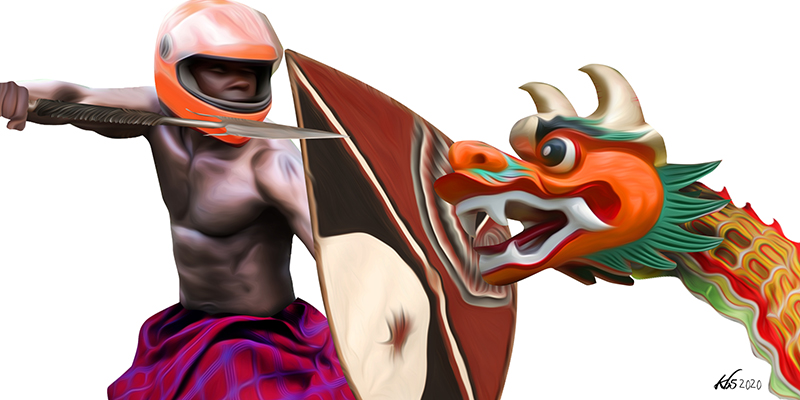Back in early April, countless images, video footage and media reports emerged of the racial profiling and accompanying discrimination against Africans living in Guangzhou, the capital of China’s southern province of Guangdong and home to China’s largest African community. Amid public fear of the second wave of COVID-19 in China, people of African descent had become primary suspects as potential sources of the virus. They were rounded up and harassed by the Chinese police, forcibly evicted from their residences and hotels, and explicitly denied access to restaurants, shopping malls and even hospitals. Some had their passports confiscated and were targeted for forced testing and quarantine, regardless of their travel history, whether or not they tested negative for coronavirus, or had been in contact with known COVID-19 patients.
For many observers, especially less ardent followers of developments in China, the recent incidents in Guangzhou might seem unprecedented. The ideology of “race” in China, however, dates as far back as the late 19th century when Qing imperial reformers sought to revive China in the face of European and Japanese colonialist expansion. Race, “minzu” (nation or nationality) and nationalism have since been entrenched into Chinese republicanism since the early 20th century and are now institutionalised in the Chinese Communist Party.
Where racism is found in China today, no group seems to have been more racially maligned than persons of African descent. As detailed in a recent Human Rights Watch report, some job advertisements in China explicitly exclude “heiren” (or blacks) or offer less pay to Africans, while non-Africans receive better pay for the same jobs. The report also explains that, before the McDonalds “Black people cannot come in” sign, restaurants, shops and taxis had already been turning blacks away.
So, the fear of a COVID-19 resurgence only served to amplify this long-standing racial discrimination targeting Africans in China. On Weibo (one of the biggest social media platforms in China – China’s version of Twitter), for example, anti-African rants have increased following the second wave of COVID-19, especially after a Nigerian man allegedly assaulted a Chinese nurse while attempting to escape from his quarantine ward at a hospital in Guangzhou. Africans have since been compared to animals and referred to as “sanfei”, a pejorative term meaning “three illegals” (illegal entry, residence, and work), implying that Africans are undocumented migrants. Some Weibo users have campaigned against inter-marriages between Africans and Chinese in a bid to preserve the “purity” of the Chinese nation (zhonghua minzu), and calls for Africans to be deported have grown louder.
Where racism is found in China today, no group seems to have been more racially maligned than persons of African descent. As detailed in a recent Human Rights Watch report, some job advertisements in China explicitly exclude “heiren” (or blacks) or offer less pay to Africans…
The fierce anger, shock and indignation this aroused manifested on social media, mainly through the #ChinaMustExplain and #DeportRacistChinese campaigns. Africans and other observers vociferously condemned the discriminatory acts as racist, demanded explanations from China and pressured African governments and institutions to take action, including by effecting state-sponsored evacuations of Africans stranded in China.
African leaders’ muzzled response
The crisis presented Africa with a leadership moment as states and various societal actors raced to respond. Rather uncharacteristically, the African leaders who responded did so swiftly, albeit barely protesting Beijing’s maltreatment of Africans in Guangzhou. Also worth noting is that no African Head of State actually made a public statement on the incidents. It is only from the Twitter handle of the Office of the African Union Commission Chairperson that the online African community learned that the African Union had invited the Chinese ambassador to the African Union to express “extreme concern at allegations of maltreatment of Africans in Guangzhou”.
Various African governments – notably Ghana, Nigeria, Uganda and South Africa – summoned Chinese ambassadors in their countries to register their disappointment at the “ill-treatment and racial discrimination” against Africans. Several African ambassadors in Beijing wrote to China’s State Councillor and Foreign Minister, “immediately demand[ing] the cessation of forceful testing, quarantine, and other inhuman treatments meted out to Africans”. At the time of writing, no further diplomatic process seems to have been pursued by Africa’s political elites, at least in the immediate term. On the contrary, they publicly concluded, not even a week after the incidents took place, that the matter had been sorted out.
Taken together, the responses of African leaders were predictably technical, tactful, and softly worded. Needless to say, this has generally been registered by the wider African public as a failure by the political elite to provide a voice and accountability to their citizens at the highest level. On the one hand, African citizens were left feeling paralysed by the racism targeting their fellow Africans in Guangzhou. On the other hand, they were left feeling alienated and dismissed as their governments’ response to the situation left much to be desired. In effect, African governments circumvented their fundamental obligation to protect citizens – one of the most basic functions of a state in its capacity as “guardian” (as per Plato’s designation in the Republic) over its citizens.
Accordingly, either because of personal inclination or the emergent expectations of the general African public, various individuals and groups found themselves adopting a leadership role, or felt obliged to. A noteworthy example of this is of Femi Gbajabiamila, who transcended his orthodox role as Nigeria’s Speaker of the House of Representatives and, in a departure from diplomatic protocol and in search for a solution, openly expressed his dismay at the ill-treatment of Nigerians in China to Nigeria’s Chinese ambassador. In another instance, over 300 human rights groups and approximately 1,800 activists in Africa penned an open letter to the Chairperson of the African Union, “strongly condemn[ing] the recent acts of discrimination, xenophobia and racism against the Africans in China” and called for “immediate remedial action”.
On the one hand, African citizens were left feeling paralysed by the racism targeting their fellow Africans in Guangzhou. On the other hand, they were left feeling alienated and dismissed as their governments’ response to the situation left much to be desired.
Meanwhile, as calls to African leaders for state-sponsored evacuations grew, Ugandan musician-turned-politician Robert Kyagulanyi Ssentamu, aka Bobi Wine, offered to partner with an American businessman, Neil Nelson, to airlift 285 Ugandans and other Africans from Guangzhou. But his goodwill gesture was declined. Moreover, Uganda’s Minister of State for Foreign Affairs allegedly advised him to leave the matter of stranded Ugandans to President Yoweri Museveni, reminding him it was the president’s job to protect Ugandans abroad. The governments of Kenya and Nigeria assisted their stranded citizens to find a way out of China.
It is thus conceivable that the perceived failure of Africa’s political elites to frame the situation in Guangzhou in a way that provided a sense of organisation and direction saw other Africans step up to take the lead in framing the situation in a way that provided a viable basis for action. Interestingly, it was then left to African leaders and Chinese authorities to react to the framing of the context that was presented by African citizens and their allies.
Noticeably, Beijing’s response followed a predictable pattern: from not commenting on the allegations at all; to dispelling the claims as rumours; then further describing them as a “wedge-driving attempt” by the U.S. to “smear China”; and finally (couched in the usual “mutual support and cooperation” and “friendship” language it uses to describe its relations with Africa) passively acknowledging the accusations as “reasonable concerns and legitimate appeals”. There has been no explicit apology, and by extension, no categorical acceptance of culpability from Beijing. Guangzhou authorities have, however, put a raft of new measures in place to combat discrimination against Africans and other foreigners in China since early May.
The official counter-responses by both African and Chinese authorities were exclusively elitist, despite being inspired by the response and activism of African netizens. Instead of responding in a more authentic manner, geared towards providing a lasting solution to this critical challenge facing the populations they claim to represent, Africa’s leaders were more focused on preserving the fundamentals of the elite-level relationship between African states and China. While this approach has implications for China’s relations with African governments, it has certainly had the unintended consequence of deepening and further exposing the scepticism held by many African citizens towards China and its collaboration with African ruling elites.
Quite glaringly, the flare-up in Guangzhou coincided with efforts by African governments to secure debt relief from China owing to severe economic disruptions linked to COVID-19. In mid-April, the G-20 and international financial institutions had granted debt reprieves until the year’s end to 40 African countries from the total 76 eligible countries. This followed the International Monetary Fund (IMF)’s earlier approval of six-months debt relief for 25 countries, 19 of them in Africa.
Given the magnitude of Africa’s debts, and China’s “special role” in the continent’s debt relief campaign, it seems that African governments found themselves having to decide between publicly speaking up for their mistreated population in Guangzhou, on the one hand, and jeopardising the opportunity for possible debt relief from China, on the other. Ostensibly stuck between a rock and a hard place, it is, therefore, highly likely that their muzzled response was an attempt to protect the cause of possible debt relief by China.
Previous cases show that political elites from some of Africa’s most indebted countries have backed Beijing on questionable matters: Uganda publicly reaffirmed Beijing’s sovereignty over Hong Kong at the height of the island’s pro-democracy protests in 2019; and 22 African states, including Angola (which alone accounts for up to 30 per cent of China-Africa loans), Sudan, Zambia and Zimbabwe (with notably strong relations with China) backed Beijing’s mass detention of Uyghurs and other minorities in the Xinjiang region of northwest China. This shows, however implicitly, that the response to incidents in Guangzhou was largely influenced by the transactional character of Africa’s relations with China.
Given the magnitude of Africa’s debts, and China’s “special role” in the continent’s debt relief campaign, it seems that African governments found themselves having to decide between publicly speaking up for their mistreated population in Guangzhou, on the one hand, and jeopardising the opportunity for possible debt relief from China, on the other.
Similarly, the official responses showed how the institutionalised narratives of those in formal leadership positions can easily be established as the dominant narratives, thus stifling more marginal attempts to frame contexts. In this way, emergent leadership can easily be superceded by institutionalised leadership, especially when marginal voices are unable to build up a critical mass.
Furthermore, the petty “Whose country is most racist?” blame game that unfolded between China and the U.S. following the Western media’s initial coverage of the events in Guangzhou illustrates how a situation that Africans tried to frame around their experiences was instrumentalised as a gambit in the US-China rivalry. This disturbing but unsurprising expropriation of African agency across the board suggests that the concerns of African actors only matters insofar as they affect big power politics.
Making sense of the response through a leadership lens
Reflecting on the work of Professor Funmi Olonisakin, the renowned peace, security and leadership scholar, one cannot help but draw on at least three insights that are important for our understanding of the response by Africa’s political elites to early April’s incidents in Guangzhou.
First, the Guangzhou incidents show that effective leadership is a function of the interaction between the person who emerges as the leader and the situation at hand, where the situation consists of the followers and the context confronting them. In being interactive, leadership is by nature dialectical; that is, it is shaped through the interplay of at least two points of reference – that of the leader and of the led. This dialectic is often the source of powerful internal tensions within leadership situations. What this situation illustrates about followership in Africa is how, despite the often defunct relationship between African leaders and their followers, the double crisis presented by the pandemic and the mistreatment of African citizens in China caused a brief shift in the ways that African publics prototyped their leaders as they anticipated a response. Research has shown how, in extreme situations, followers tend toward primitive prototyping of their leaders, and develop a desire for powerful, charismatic and protective leadership. This is useful for thinking about the reasonable expectation from African citizens for more proactive, protective and robust responses to the situation in Guangzhou, despite potentially not expecting this kind of leadership in ordinary contexts as African leaders have poor track records on accessibility, accountability and delivery.
Second, the incidents reveal that situations make leaders. The Guangzhou situation proved to be a real test of the quality of leadership that exists on the African continent. When the appeals by ordinary Africans for direction in this moment of crisis left them feeling they were not being led, emergent leadership became apparent in diverse ways across the continent. As Africans looked to their leaders to frame and concretise the situation for what it truly was, the absence of a unified pattern of meaning provided impetus for the negation of leadership. Femi Gbajabiamila, Bobi Wine, the group of civil society organisations and activists, together with the African online community, mobilised meaning by articulating what Africa’s political elites left implicit or unsaid, and in so doing, enacted a system of shared meaning that provided a basis for organised action. Thus framed, the nature of leadership and how it is exercised in relation to societal mobilisation are central to understanding the response patterns and the outcomes achieved in this crisis situation. A comprehensive response to the situation in Guangzhou required certain types of action, as articulated by the needs of the Africans in Guangzhou and the voices of the individuals and groups that engaged in leadership to amplify these needs. Arguably, therefore, the interplay between African leaders and the population they claim to represent within the context of incidents in Guangzhou made some leaders in Africa, while vitiating others.
When the appeals by ordinary Africans for direction in this moment of crisis left them feeling they were not being led, emergent leadership became apparent in diverse ways across the continent.
Third, and perhaps more significantly, “the sense of common purpose between the person(s) engaging in leadership and the population to whom leadership is directed” – or mutuality – remains an important indicator for assessing the exercise of leadership in any situation. Mutuality between Africa’s leaders and the people they lead was clearly in short supply in the various responses to dealing with the Guangzhou situation. Arguably, therefore, the manner in which influence was exchanged between Africa’s political elites and the African public that looked up to them for direction in this moment of crisis was far from compelling.
Forging new paths
As reporting on the situation in Guangzhou begins to slow, it is worth emphasising the need for Africa’s leaders to continue working toward a comprehensive and clearly articulated China strategy, both at the state and continental level. This strategy not only needs to set out diplomatic and economic policies for engaging China, but also needs to articulate how African citizens and people-to-people relations fit into visions for the future of Africa-China relations. In the long-term, as David Mwambari prescribes, Africa needs to look at itself differently for the rest of the world to seriously consider it as a partner [emphasis intended].
The quality of leadership exercised on the continent, as illustrated, has so much to offer this debate. In the short term, African governments, together, preferably through the African Union, need to exercise leadership by publicly and unequivocally calling on the Chinese government to accept responsibility for the racially-driven maltreatment of Africans in China and enforce the already-in-place anti-discrimination measures against Africans, in particular. Short of this, the trust deficit in the relationship between the broader African public and their leaders will continue to widen, and the opportunities for the exchange of influence between the political elites and African citizens will spiral downwards, especially on matters concerning Africa-China relations.







